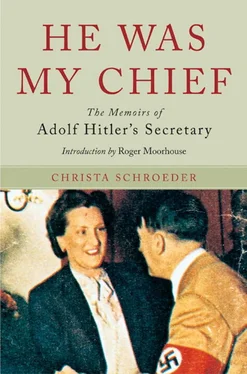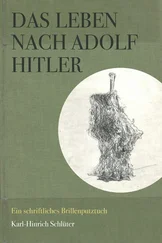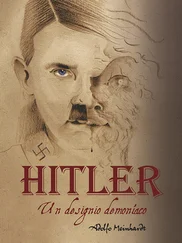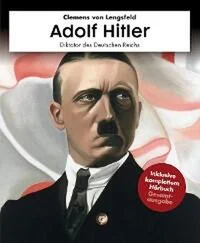Christa Schroeder - He Was My Chief - The Memoirs of Adolf Hitler's Secretary
Здесь есть возможность читать онлайн «Christa Schroeder - He Was My Chief - The Memoirs of Adolf Hitler's Secretary» весь текст электронной книги совершенно бесплатно (целиком полную версию без сокращений). В некоторых случаях можно слушать аудио, скачать через торрент в формате fb2 и присутствует краткое содержание. Город: Barnsley, Год выпуска: 2012, ISBN: 2012, Издательство: Frontline Books, Жанр: История, Биографии и Мемуары, на английском языке. Описание произведения, (предисловие) а так же отзывы посетителей доступны на портале библиотеки ЛибКат.
- Название:He Was My Chief: The Memoirs of Adolf Hitler's Secretary
- Автор:
- Издательство:Frontline Books
- Жанр:
- Год:2012
- Город:Barnsley
- ISBN:978-1-7830-3064-4
- Рейтинг книги:4 / 5. Голосов: 1
-
Избранное:Добавить в избранное
- Отзывы:
-
Ваша оценка:
- 80
- 1
- 2
- 3
- 4
- 5
He Was My Chief: The Memoirs of Adolf Hitler's Secretary: краткое содержание, описание и аннотация
Предлагаем к чтению аннотацию, описание, краткое содержание или предисловие (зависит от того, что написал сам автор книги «He Was My Chief: The Memoirs of Adolf Hitler's Secretary»). Если вы не нашли необходимую информацию о книге — напишите в комментариях, мы постараемся отыскать её.
He Was My Chief: The Memoirs of Adolf Hitler's Secretary — читать онлайн бесплатно полную книгу (весь текст) целиком
Ниже представлен текст книги, разбитый по страницам. Система сохранения места последней прочитанной страницы, позволяет с удобством читать онлайн бесплатно книгу «He Was My Chief: The Memoirs of Adolf Hitler's Secretary», без необходимости каждый раз заново искать на чём Вы остановились. Поставьте закладку, и сможете в любой момент перейти на страницу, на которой закончили чтение.
Интервал:
Закладка:
Chapter 3
Hitler’s Dictation and the Staircase Room
HITLER GAVE DICTATION MAINLY in the late evening or at night because that was when he had the best ideas, he informed me. So that a secretary (or often two) would be available fresh from rest, Schaub would give early notice of the work that had to be done. Often the dictation would be postponed for days, and Schaub would explain by saying that ‘the boss is waiting for a report’. This gave rise to a secretary-on-standby service where one of us would sit in wait in the so-called Staircase Room near Hitler’s study. House manager Kannenberg would ensure that we did not go hungry. When I first arrived in Berlin and was ‘on call’ with the Liaison Staff across the road from the Führer-apartment, the sight of the bowls of fruit alone, with their Williams pears, blue Brussels grapes, apples, oranges and plates with various sandwiches was a delight for the eye.
The Führer’s household was run by house manager Arthur Kannenberg and his wife Freda. As guests were always invited for midday and the evenings, one could compare the Führer household to a well-run restaurant. Kannenberg actually came from an old Berlin family of gourmets. His father had owned a licensed restaurant of renown in the capital, and in the 1920s his son became the proprietor of the popular and well-loved eating house on the outskirts of Berlin known as ‘Uncle Tom’s Cabin’. I never went there myself, but Frau Magdalene Haberstock, a Berliner and widow of art-dealer Karl Haberstock, whom Hitler employed to buy antique paintings, told me once. ‘You took tram 76 to Hundekehle and then made a pilgrimage on foot to the beautifully positioned garden restaurant which served not only coffee and pastries but also high-quality meals in the evenings.’ Immediately after this restaurant went into liquidation, Kannenberg opened another near the Berlin Anhalter railway station. Goebbels recommended Hitler to visit the establishment, and from then on whenever Hitler arrived at the Anhalter aboard the express from Munich with his entourage he always liked to go to Kannenberg’s and tuck into the outstanding vegetable and salad dishes which were a speciality of the house. Kannenberg was not only an outstanding gourmet but an excellent humorist blessed with the legendary Berlin wit. Hitler found his clowning and folksy musical renderings on the accordion so much to his taste that at the beginning of 1932 he appointed Kannenberg to manage the officers’ mess at the NSDAP Braunes Haus in Munich.
After taking power in 1933, Hitler brought Kannenberg and his nice, quiet wife Freda, daughter of a German forester, to his apartment in the Radziwill Palace from where the Kannenbergs ran the Führer-household until 1945. Their field of competence included hiring staff, providing uniforms, pay and accommodation, recruiting personnel for house and kitchen, the purchase and control of food and drink, household laundry and preparing the daily menu. Their jurisdiction extended to state receptions and all organisational matters such as the floral decoration of tables, reception and social rooms and the hiring of additional servants and waiters (at major state receptions these were drawn from the SS-Leibstandarte Adolf Hitler and the president’s Chancellery in livery). The major-domo for the latter would pound the floor with his mace before announcing each guest or couple by name.
Hitler had a great fear of committing a faux pas at receptions. He was always plagued by the idea that his staff might err and so lose him prestige. He threatened Kannenberg with disciplinary action should he be guilty of any slip-up of this kind at a reception. Before his guests arrived, Hitler would always cast his eye over the dining table to ensure nothing had been forgotten. In 1939 in conversation with an officer of the close staff who had accompanied Ribbentrop to Moscow, the officer related to Hitler how Stalin had checked the table before dinner to make certain was all in order. I said: ‘Stalin seems to have the same concerns as yourself that something might go amiss,’ to which Hitler replied: ‘My servants are in order.’
Kannenberg had an important function just before every Christmas. It always gave Hitler special pleasure to send presents to people he liked and to whom he felt close. For birthdays and especially at Christmas Hitler never forgot to select his presents for this personal circle comprised not only of Hitler’s closest colleagues and their wives, and artists and artistes whom he respected, but also people he knew and friends from the old street-fighting days, especially women with whom he had been friendly before taking power and had formed part of his social circle at that time. Hitler often expressed his regret when taking tea with his female secretaries in the Staircase Room that as Reich Chancellor it was no longer possible for him as it had once been previously to go shopping in Berlin for presents. He said that this had always given him great pleasure in the past. Since Hitler wanted to choose the presents for himself, house manager Kannenberg would select pieces of art from Berlin’s most exclusive shops for Hitler to make his choice at the Reich Chancellery. On several occasions he allowed me to assist in the choice.
Before Christmas, Hitler would have Kannenberg set out the presents on tables, chairs and on the floor of the private library and in Hitler’s study. I can still picture these presents before me today◦– paintings, Meissen porcelain, silver trays and bowls, travel necessities, bracelets, dress handbags, opera glasses, hair driers, travel rugs, table lamps, coffee and tea services, silver spoons, gold watches, books and picture frames, articles for the writing desk, leather trunks, car rugs and so on. Hitler would then decide from a long list of recipients who would receive what this year. Julius Schaub kept this list, which also indicated what everybody had received from Hitler in past years.
Kanneberg administered a small empire. Hitler once said of him: ‘He controls the kitchen like a Pasha!’ Kannenberg was absolutely certain of his power, reigned like a sovereign and was not averse, particularly during the war, to making generous gifts from the Führer-household supplies in order to curry favour with prominent individuals. During the war, every year before Christmas, Hitler received from the Iman of Yemen a couple of sacks of coffee beans as a present. Everybody on his presents list would receive a few pounds of the beans, which at that time were very welcome. Anybody in Kannenberg’s good books never went without coffee or other goods then subject to rationing. Frau Magda Haberstock, who stayed during the war as a guest with her friend Kluge on a Silesian property, recalled Kannenberg ‘turning up there with a carload of food and things. We stood there gaping, I can tell you. It was all on the side.’ To my question whether Kannenberg would have accepted money for it, Haberstock replied: ‘No, he wanted to make himself loved!’ To my observation: ‘He was always a bit of a wheeler and dealer,’ Haberstock retorted: ‘A bit is putting it mildly!’
Kannenberg’s wife was very adept and had a good eye for the placing of table decorations and floral arrangements. Flowers were delivered to the Reich Chancellery by Berlin’s leading florist, the Rothe firm in the Hotel Adlon on Unter den Linden. The Kannenbergs were often sent to the Berghof for the visit of prominent guests and to ensure the smooth running of the state dinners. Here Frau Kannenberg would decorate the Great Hall, with its museum-like coolness, with vivid blooms. She was always able to find a blend between the colours of a painting and the flowers she put nearby. Her arrangements always met with Hitler’s full approval. For him she represented the personification of the ideal German housewife. She always styled her hair the same way, the then modern Olympia style; she was well-groomed, circumspect and of quiet demeanour, and without doubt the nicer half of the Kannenberg pair.
Читать дальшеИнтервал:
Закладка:
Похожие книги на «He Was My Chief: The Memoirs of Adolf Hitler's Secretary»
Представляем Вашему вниманию похожие книги на «He Was My Chief: The Memoirs of Adolf Hitler's Secretary» списком для выбора. Мы отобрали схожую по названию и смыслу литературу в надежде предоставить читателям больше вариантов отыскать новые, интересные, ещё непрочитанные произведения.
Обсуждение, отзывы о книге «He Was My Chief: The Memoirs of Adolf Hitler's Secretary» и просто собственные мнения читателей. Оставьте ваши комментарии, напишите, что Вы думаете о произведении, его смысле или главных героях. Укажите что конкретно понравилось, а что нет, и почему Вы так считаете.












